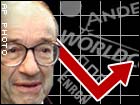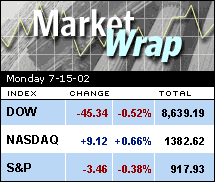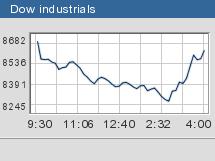
NEW YORK (CNN/Money) -
Stocks staged a stunning turnaround Monday that turned what would have been one of the year's biggest down days into a modestly lower session for blue chips on Wall Street.
The late rally pulled the Dow Jones industrial average from a steep drop of 439 points to a loss of just 45.34 for the day, ending at 8,639.19. The Nasdaq composite index actually ended higher for the session, adding 9.12 to 1,382.62, after being down about 58 points earlier. And the Standard and Poor's 500 index trimmed its loss to a mere 3.46, to 917.93.
Analysts attributed the reversal in part to bargain hunting after recent steep declines. In addition, some speculated that investors who had been betting on further declines started covering their short positions in advance of Federal Reserve Chairman Alan Greenspan's testimony before Congress on Tuesday.
"This is not your mom and pop selloff," Art Hogan, chief market analyst at Jefferies & Co., said regarding the big drop and the quick recovery. Traders "move in and out pretty quickly...and as soon as there was a suggestion of a rally, nobody wanted to end the day short," or betting stocks would fall further, he added.

The 30-share Dow, the world's most widely watched stock index, fell near its post-Sept. 11 lows and the Nasdaq hit its lowest levels since May of 1997 before buyers stepped in and prompted a turnaround in the major indexes.
Larry Wachtel, market analyst with Prudential Financial, said short sellers, who bet that stock prices will fall, were probably unwilling to hold their positions in case Greenspan's remarks to Congress on the state of the economy prompt a rally on Tuesday.
A bad beginning
Investor sentiment started sour after the dollar accelerated its recent slide, hitting parity with the euro for the first time in two years. The U.S. currency also declined versus the yen.
Dow components American Express (AXP: Research, Estimates), J.P. Morgan (JPM: Research, Estimates) and Citigroup (C: Research, Estimates) all fell early on before regaining some ground. And FleetBoston Financial (FBF: Research, Estimates) took a $1 billion charge that plunged it into the red as it badly missed Wall Street forecasts for its operating income in the second quarter
And comments by President Bush didn't help matters. His attempt to reassure an audience in Birmingham, Ala., that the U.S. economy remains sound seemed to have little effect. The major indexes fell further after Bush spoke.
Reminding investors of the Enron-like accounting scandals that have plagued markets since last year, federal prosecutors could file an indictment against the founder of cable TV operator Adelphia Communications and his three sons as early as Monday, according to a published report. Investigators have been looking into the family since Adelphia said it had lent them $3.1 billion.
Reports over the weekend said congressional investigators had documents that indicated WorldCom's (WCOME: Research, Estimates) accounting irregularities stretched back to 2000. Rep. Billy Tauzin, R-La., chairman of the House Energy and Commerce Committee, confirmed that at a press conference held late in the trading session.
"It's amazing. It just seems that Bush and the administration did not really get the message," said Charles Payne, CEO of Wall Street Strategies. "We know that Republicans are the get-tough party, and they're going to ask for longer prison terms, but he hasn't addressed the problems of the [accounting issues] game itself."

A blockbuster pharmaceutical deal failed to light a fire under that beleaguered sector. Pfizer (PFE: Research, Estimates), the world's largest drug company, agreed to buy rival Pharmacia (PHA: Research, Estimates) in a stock deal valued at $60 billion. But only possible takeover target Bristol-Myers Squibb (BMY: Research, Estimates) was buoyed by the news, with Dow components Merck (MRK: Research, Estimates) and Johnson & Johnson (JNJ: Research, Estimates) both falling.
But technology shares managed to shrug off a Merrill Lynch research note recommending investors "sell technology shares into strength at every opportunity" except for Dell Computer (DELL: Research, Estimates). Dow components Intel (INTC: Research, Estimates) and IBM (IBM: Research, Estimates) finished the day strong, as did Sun Microsystems (SUNW: Research, Estimates).
Stocks initially failed to get a boost from Banc of America chief market strategist Thomas McManus' raising the firm's recommended portfolio equity allocation to 60 percent from 55 percent, citing valuation. But McManus said in a research note that "recognizing a bottom is near impossible."
European markets slumped to near four-year lows. Asian-Pacific stocks finished lower Monday, with Tokyo's Nikkei index down more than 2 percent.
Treasury prices fell, pushing the 10-year note yield up to 4.63 percent.
Light crude oil futures fell 47 cents to $27.04 a barrel in New York, and gold rose $4 to $319.90 an ounce.
Market breadth was negative. On the New York Stock Exchange, losers beat winners by nearly 8-to-3 as 1.89 billion shares changed hands. On the Nasdaq, decliners beat advancers nearly 3-to-2 as 1.99 billion shares traded.
The government reported that May business inventories showed a rise of 0.2 percent, compared with the unchanged reading expected by economists surveyed by Briefing.com.

|

